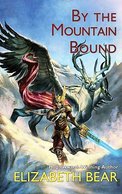
| Series: | Edda of Burdens #2 |
| Publisher: | Tor |
| Copyright: | November 2009 |
| ISBN: | 0-7653-1883-0 |
| Format: | Hardcover |
| Pages: | 318 |
I've been looking forward to this book since I read All the Windwracked Stars. Bear's wonderful world-building, combining Norse mythology with futuristic technology crossed with magic, had me hooked, and I wanted to read more of it. Somewhere along the line, I think I was told that this book is actually a prequel, but I'd forgotten that entirely until I started reading it.
Given that All the Windwracked Stars begins after Ragnarok, one might reasonably expect that prequel to get into more traditional Norse mythology. The world history turns out to be more complex than that. As Bear adds additional background and explanation, including exploring the pasts of Muire and the Grey Wolf, one soon finds out that the battle wasn't quite what we thought it was.
Unfortunately, being a prequel also means that the parts of the world building that I enjoyed the most aren't here. Worse, from my perspective, By the Mountain Bound is basically the Grey Wolf's story. Muire appears as another viewpoint character (the third being a war leader named Strifbjorn), but it's the Wolf's emotional reactions, personal journey, and struggles that are at the center of this book. And I'm afraid he's not growing on me as a character. I disliked him in All the Windwracked Stars, and I disliked him just as much here. He has too much angst, too much overwrought self-betrayal, and too much darkness of a type that grates on me.
About 100 pages in, I thought I was going to have to say that this was the first Elizabeth Bear novel I disliked. I found the initial stage-setting painfully slow and mostly engrossed in a relationship that I never had any feel for and which never held my interest. The story is also remarkably sparse compared to the idea-filled world of All the Windwracked Stars; at times, it's sparse to the point of feeling like a stage play. A small number of characters interact, almost entirely through dialogue, in a very small number of northern winter settings. Without characters I liked (Muire gets short shrift at the start of the book) and without distracting shiny ideas, I found the first section of this book to be an uninteresting slog.
This does change. Once the intrigues start, the pace picks up, and the story turns into a tense political tragedy. The stage feel remains, but serves the story well. I think the movement between viewpoint characters creates a form of soliloquy, and the theme of personal compromise, despair, and deception is directly in the spirit of stage tragedy.
To warn, the underlying bleakness of Norse mythology comes out here even more completely than it did in the previous novel. If you want triumph with your heroism, this is not the book to reach for. Characters are trapped in impossible situations, badly damaged, and forced to choose between tenuous moral codes and self-destructive indulgence. It's the sort of tragedy in which the noose tightens slowly, the main character goes mad, and whatever justice is done by the end of the story comes at a horrible price.
If that doesn't turn you off entirely, though, the last half of this book is riveting stuff. Muire is in some ways a better character here than she is in the previous book; she's younger, less certain, but also more heroic. I never liked Wolf in this book, but I at least understood him more, and the way Bear ties together Norse mythology works rather well. And the villain is excellent: the sort of villain who has several twists and hidden agendas but whose motives in the end make sense, a villain who fits Norse mythology perfectly and one that's legitimately frightening. There's plenty of heroism and cause for heroism, even if it's largely of the doomed variety, and enough tension that I had a hard time putting the book down.
My feelings about the whole book are conflicted but moderately positive. I think the ending does redeem the start of the book enough to make it worth reading. It's a strong execution of its theme. Some of the stylistic effects worked: the stage feeling, for instance, plays well with the tragedy of the story and keeps the reader tightly focused on the interplay of characters and emotions. Some didn't work. I was increasingly annoyed by the shift from third person limited past for two viewpoint characters to first person present for the Wolf. I'm not usually as sensitive to present tense in fiction as some, but this is one of the places where to me it felt like a distracting stunt rather than a useful cue for the reader. But that's the sort of book this is. It takes stylistic chances, such as with the way it ties into All the Windwracked Stars at the conclusion. Some of those chances work and some of them don't, but overall I'm glad I read it.
You could read this book alone without having read the previous volume in the series and everything would make sense, since after all it's a prequel. I suspect All the Windwracked Stars might make even more sense if one read this book first, but you'd lose a lot of the process of discovery. I did wish I'd read the other book more recently so that I could catch more of the parallels and piece the whole story together in my head. I'm not sure what one would make of this book without its context in the series. It would depend even more heavily on how the stage-effect tragedy struck the reader.
If you liked the previous book, cautiously recommended, but know what you're getting into first.
Followed by The Sea Thy Mistress.
Reviewed: 2010-04-28